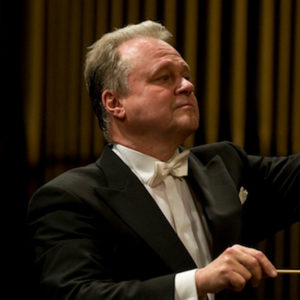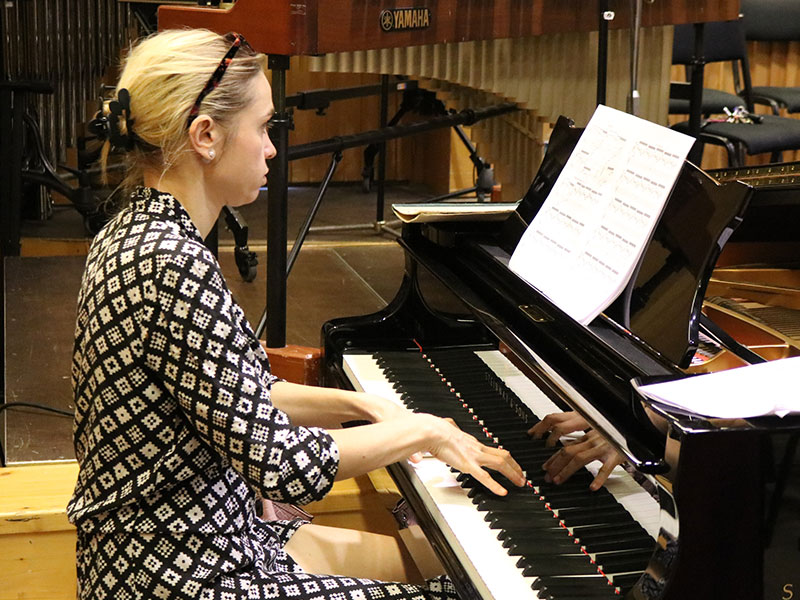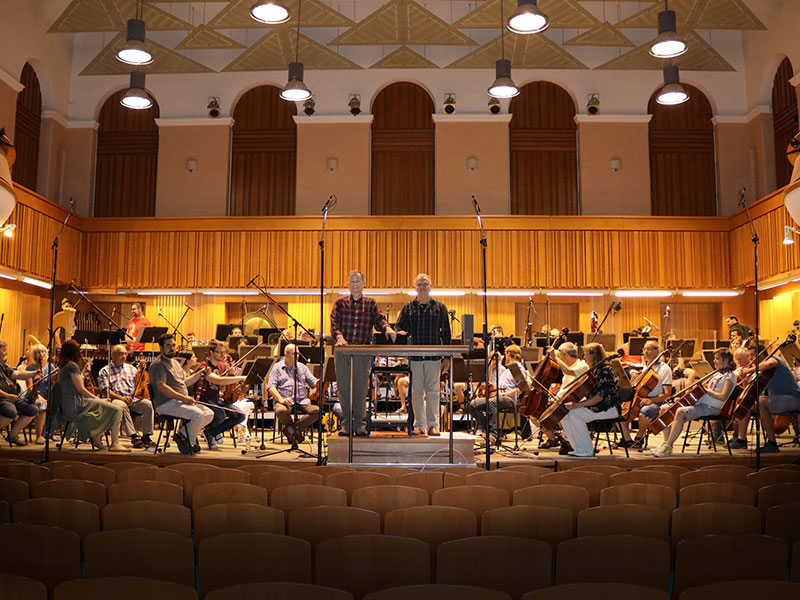
Share Album:
Parallel Realms
Sergio Cervetti composer
Moravian Philharmonic Orchestra | Petr Vronský conductor
Sergio Cervetti, born in Uruguay, immigrated to the United States in 1962 to study contemporary composition, and his work contains a certain cosmopolitan quality reflective of his past and present. Although essentially a minimalist since 1970, he has branched out to embrace and incorporate diverse elements from a variety of aesthetics. The versatile creator understands how to pull the virtually unimaginable from its metaphysical realm into the here and now, a sudden manifestation of spirituality transcending dissonance. Ever-present is the nexus of nature and science, of the mundane and the miraculous.
Et in Arcadia ego is, most of all, the invocation of a childhood memory. Inspired by an adventurous journey to the island reserve Martín García off the coast of Uruguay, which Cervetti undertook as a young boy of only 7, it illustrates the traveler’s awe at reaching a paradisaical shore. The composer found himself struck with the same sensation years later on the other side of the world, in France, while viewing Nicolas Poussin’s Baroque painting of the same name at the Louvre. Both the painting and the musical work present the paradox of not only death within paradise, but death’s vital role in the renewal of life.
This meditation on mortality is almost religious in nature and thus sets the stage for Consolamentum, an homage to the Cathar and Albigensian martyrs who suffered persecution by the Catholic Church in 12th-century Southern France. The title alludes to the unique, somewhat mystified sacrament of the former, which was considered an immersion in the Holy Spirit and supposed to bring about absolution from all sin.
Plexus, on the other hand, takes the listener back to the realm of science. The minimalist, aleatoric composition mimics a branching network of nerves, being, in its own right, an intricate microcosm of structure and sound. Cervetti truly shines in this finale, with the impressively complex, fractal structures eventually thinning out to a mere whisper. This conclusion is highly unexpected – and it is breathtaking.
Listen
Stream/Buy
Choose your platform
Track Listing & Credits
| # | Title | Composer | Performer | |
|---|---|---|---|---|
| 01 | Et in Arcadia Ego | Sergio Cervetti | Moravian Philharmonic Orchestra | Petr Vronský, conductor | 20:31 |
| 02 | Consolamentum | Sergio Cervetti | Moravian Philharmonic Orchestra | Petr Vronský, conductor | 14:39 |
| 03 | Plexus | Sergio Cervetti | Moravian Philharmonic Orchestra | Petr Vronský, conductor | 13:13 |
ET IN ARCADIA EGO is dedicated to the island Martín García.
CONSOLAMENTUM is dedicated to In Memoriam Sofía Guigou-Cervetti, 1905-1989.
PLEXUS is dedicated to Guillermo Espinosa (1905-1990).
The composer thanks all the generous contributors who have supported his work and this project, the musicians of the Moravian Philharmonic Orchestra under the baton of Petr Vronský, and the PARMA Team for their collaboration in producing this album.
Sergio Cervetti’s scores are available through PARMA Publishing. For more info please contact PARMA Publishing.
Cover illustration adapted from Nicolas Poussin The Shepherds of Arcadia.
All works copyright © Sergio Cervetti Music.
www.sergiocervetti.com
All tracks recorded June 18-20, 2018 at Reduta Hall in Olomouc CZ
Session producer Vít Mužík
Co-producer Bob Lord
Session engineer Jan Košulič
Assistant engineer Maroš Hlatký
Executive Producer Bob Lord
Executive A&R Sam Renshaw
Vice President, Audio Production Jeff LeRoy
Production Engineer Lucas Paquette
Editing, Mixing & Mastering Shaun Michaud
Recording Sessions Manager Levi Brown
Recording Sessions Assistant Emma Terrell
Art Director Brett Picknell
Design Ryan Harrison, Edward A. Fleming
Publicity Patrick Niland
Artist Information

Sergio Cervetti
Sergio Cervetti left his native Uruguay in 1962 to study composition in the United States. In 1966 he attracted international attention when he won the chamber music prize at the Caracas, Venezuela Music Festival. After studying with Ernst Krenek and Stefan Grové and graduating from Peabody Conservatory, he was subsequently invited to be Composer-in-Residence in Berlin, Germany in 1969-70.

Moravian Philharmonic Orchestra
The Moravian Philharmonic Orchestra is one of the foremost and oldest symphony orchestras in the Czech Republic. It is based in the historical capital of Moravia, the city of Olomouc, and has been a leader of music activities in the region for the past 70 years. Its artistic development was directly influenced by distinguished figures from the Czech and international music scene.

Petr Vronský
After successes in several important international competitions for conductors — including the competition in Besancon France in 1971 and the Karajan Competition in Berlin in 1973 — his career began at the opera company in Pilsen. From 1974 to 1978, he was Chief of Opera of the State Theater in Usti nad Labem, Czech Republic. In 1978, he was appointed Chief Conductor of the Brno Philharmonic Orchestra, a position he held until 1991. Vronsky was later appointed Chief Conductor of the Janacek Philharmonic Orchestra Ostrava in 2002.
Notes
PARALLEL REALMS is the eighth Cervetti Navona Records album and features spellbinding 21st-century works for orchestra that are shaped by a meticulous understanding of craft, a sharp and playful wit, and with a sincerity and wisdom for music which is metaphysical and spiritual. Three single-movement symphonic works are counterparts of scrupulous musicianship that unlock the treasure chest of childhood memory, invoke a sacred rite, and imagine mapping the corporeal.
Et in Arcadia ego is a symphonic poem dedicated to the island Martín García, a nature preserve off the coast of Uruguay. Nicolas Poussin’s painting in the Louvre, The Shepherds of Arcadia, depicts a paysage eerily reminiscent of what Cervetti felt he saw as a boy when visiting the island. It bears an inscription, Et in Arcadia ego, generally interpreted to be a meditation on mortality. In this paradisiacal land death is ever present even as it renews the flora and fauna. The idée fixe of shifting pitches B and Bb which are almost constant and lend a pseudo-impression of tonality, the minimalistic imitation of avian cacophony, and a criollo tune near the end are masterfully orchestrated to summon a canvas of sound and a remembrance of childhood euphoria now lost; along with the island that was once Uruguay’s but is now under Argentina’s jurisdiction.
Consolamentum is titled after the sacrament of the medieval Christian Cathars during confirmation in the faith and upon impending death so as to unite the believer with the Holy Spirit and elevate to a blessed plane. The work is a musical offering for the Cathars, Albigensians, and Waldensians who suffered persecution under the Inquisition. It is constructed around two chords, the equivalence of the tonic-dominant relationship, that are peppered with dissonances and running scales which culminate in a quasi-tonal, unresolved ending. The work elicits a belief in regeneration and mankind’s potential for elevation to a spiritual plane derived from, but not dependent upon, a religious rite.
Plexus, a semi-graphic score commissioned in 1970 and revised in 2016, refers to a branching network of vessels, nerves, or systems that becomes evident with an accumulating counterpoint of similar lines which expand into fractal, dissonant textures. The original score included popular radio and TV slogans from the 1970’s spoken by orchestra members. It is revised by a plexus-in-reverse where textures progressively thin out to finish pianissimo.
— KPR, October 2018



